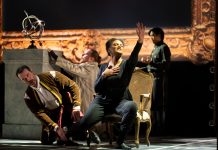
Nandi Comer isn’t tapping out. Far from it. The Detroit-based poet is in fighting shape. And yes, we do mean fighting. It’s not a mixed metaphor between sports and writing. Her book, Tapping Out, out May 15 from Northwestern University Press, uses lucha libre — the brightly masked Mexican wrestlers — to explore issues of identity and belonging. And it doesn’t shy away from the physical, even violent, aspects of the sport, using them as a lens into the violence that communities also face.
We talked to Comer about her new book, lucha libre, and life during the time of coronavirus while she was at home after deciding not to attend the annual Association of Writers & Writing Programs (AWP) Conference and Bookfair in San Antonio, Texas — the see-and-be-seen conference for writers.

Hour Detroit: How is COVID-19 affecting your book launch?
Nandi Comer: The writing life in Detroit can feel really isolating because we’re not in a hub like New York or Chicago with a lot of events and opportunities for the reading community to get their hands on your stuff. So, AWP is really important. That’s where you meet reviewers who might be interested in putting the book in upcoming issues. Oftentimes, when Midwestern writers don’t make it to AWP, it means you’re not in front of those people for a whole year.
How is it affecting your creative life?
My other hat is as a DJ. So, I’m using that to stay sane. Right when I sign off from work, I go to my turntables and mix a couple of records and play around with some things. I’ve gotten rusty, so that’s been a good release and been really important to have.
Tell us a little bit about the book.
It uses lucha libre as a jumping-off point to look at what it means to be traveling abroad, especially as a black American in places where there aren’t a lot of black people. It’s about theater, physical theater, and this question about what is real and not real. I get to play with the choreographies of what we experience and look at real stories of some wrestlers who go through violent, personal bodily harm.
How did you discover lucha libre?
I used to live in Guadalajara, Mexico, and while I was there, I had a friend who was a fan of the sport take me to a match. I just remember turning to my friend and being really shocked and amazed. It was an adrenaline rush. After that, I was trying to go all the time.
How does it go from that to a book of poetry?
I met a poet at a conference who was wearing a bracelet with the lucha libres on it, and I was fascinated by the fact that she had it. And she asked me why I didn’t write about them. So, I put away these really bad travelogue poems I’d been writing about my experiences and started to just write about the wresting. I started to think about what would happen if I used that language to talk about what I had been trying to write about for years.
What did you learn in the process of writing this collection?
One of the things that was really challenging is talking about violence, because I just default to what is the nonviolent thing. But in this, I’m trying to interrogate violence and understand the drive behind it. I’m really struck by stories that drive someone to have to make these choices. And what does it mean to be a part of a community where these things happen?
How has Detroit propelled you — or harnessed you — as a poet?
I had a really hard time reconciling my relationship with the city. I thought when I was coming out of college that I would never turn back. It was really hard as a nerdy creative who was quiet and oftentimes felt uncomfortable in all spaces to think that Detroit was going to be where I would land. But I was called back home because one of my family members had an illness. What really reintroduced me to the city was being an adult and connecting with the activists and artists here. They have been my community since I returned in 2005.
What does it mean to be a Detroit poet?
We don’t have lot of institutions. There isn’t something driving one voice or saying how this is how Detroit sounds, or writes, or produces. So, when you say you are a Detroit poet, it can mean a lot of different things. And because we don’t have institutions here, we don’t have traditional understandings of how the writing world works. We work from a deficit. Back in 2005-2006, there was a writer who invited a group of us into her home and taught us how you get published. Those writers she mentored are now out representing Detroit in a way I don’t think even Detroiters realize.
|
|
|










